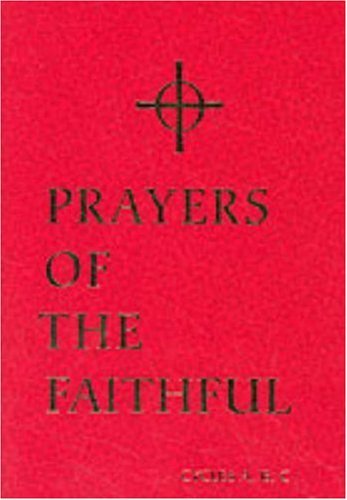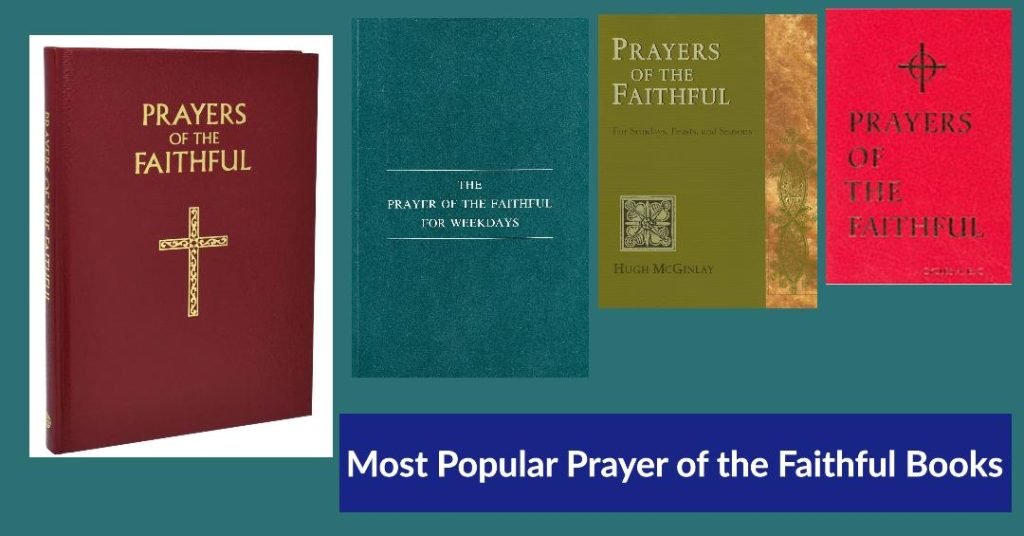4 Most Popular Prayer of the Faithful Books Today – Which is the best?
As a Catholic seminarian crafting bidding prayers for use during Mass, I’m often asked about the best resources for Prayers of the Faithful. While I personally write original prayers following the guidelines of the General Instruction of the Roman Missal (GIRM), having high-quality published collections on hand can provide inspiration and models.
While these are apparently the most common Prayers of the faithful books out there, I do not recommend all of them. in fact, the first two books are the only ones I honestly recommend, as the other books fail in multiple respects. If you want a prayers of the faithful book you can trust, trust my recommendation and go with the first one, or the first two.
My Top 2 (and only) Recommendations
#1: Prayers of the Faithful by Peter J. Elliott (Catholic Book Publishing)
Prayers of the Faithful by Peter J. Elliott

My top pick is this new edition from Bishop Peter J. Elliott. It reflects the vision of recent popes and anticipates the revised Roman Missal translation. With intercessions for all Sundays, solemnities, feasts and more, it receives rave reviews for being reverent, faithful to the liturgy, scripturally-grounded yet accessible. Valuable supplementary material like the introduction on the history and structure of the Prayer of the Faithful makes this a stellar resource.
Pros:
- Reflects vision of recent popes and new Roman Missal translation
- Reverent, faithful to the liturgy
- Scripturally grounded yet accessible prayers
- Valuable supplementary material like introduction on history/structure
- Receives rave reviews for quality (and for good reason)
Cons:
- No major cons I can think of, and all buyers (who are mostly theologians), seem to have no problems at all with this book. The only thing I lament about is the fact that there are no intentions for weekday masses.
My Opinion: In my opinion, this is the Best Prayers of the faithful book available for sale, and you should definitely consider ordering today while it is still available.
#2: The Prayer of the Faithful for Weekdays by Eltin Griffin
The Prayer of the Faithful for Weekdays by Eltin Griffin

For daily Mass, Griffin’s collection aligns the intercessions with the weekday readings, making it an excellent timesaver for liturgy coordinators. While some phrasing may need updating, reviewers praise it as packed with options and a great resource “for the liturgy coordinator on the go.”
Pros:
- Aligns prayers with weekday Mass readings
- Time-saving resource for liturgy coordinators
- Packed with many options
Cons:
- Some phrasing may need updating
- I also think it’s too expensive at $112.
My thoughts: In my opinion, this is a very useful resource for weekday masses. Since my first recommendation does not address weekday masses, you should order this as well if you need a book with intentions for weekday masses.
#3: Prayers of the Faithful: Cycles A, B, and C (Liturgical Press)
Prayers of the Faithful: Cycles A, B, and C

Covering all 3 liturgical cycles, this collection from “respected authors and liturgists” like Peter Scagnelli claims to provide comprehensive prayers for Sundays, holy days, solemnities, feasts and rituals like baptism and marriage. The convenience of having all cycles in one volume is a plus (at least, so they claim!).
Cons:
- Most reviewers found the prayers to be poorly written
- Criticized for ideological leanings (anti-capitalism, identity politics, etc.)
- Mixes decent prayers with “spectacularly awful” ones
My thoughts: To keep it brief, I wouldn’t buy this book. Give it a try if you want a good laugh.
4. Prayers of the Faithful for Sundays, Feasts and Seasons by Hugh McGinlay
Prayers of the Faithful for Sundays, Feasts and Seasons by Hugh McGinlay

McGinlay’s prayers are tightly linked to the biblical readings, with the first two prayers relating to the first and second readings, and the third and fourth reflecting the Gospel teaching. The “sense lines” aid in proclamation. While more socially-conscious in tone, these ecumenical, inclusive prayers can provide a thoughtful starting point.
Pros:
- Tightly linked to biblical readings
- “Sense lines” aid in proclamation
Cons:
- More socially-conscious tone may not suit all parishes
- Some opening/closing prayers critiqued as theologically questionable
- Described as more of a guideline than a ready-to-use resource
My Thoughts on this book: While this is not as bad as the one above, I won’t totally recommend it, because to me, some of the opening and closing prayers are theologically questionable and sound like something written by a committee rather than an insightful theologian

